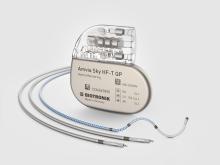Beyond the Workplace: BIOTRONIK's Commitment to Saving Lives How One Colleague’s Act Inspires a Culture of Preparedness at BIOTRONIK

On a warm June afternoon in 2022, something happened that Toni Turunen would never have expected during the Finnish military service parade in Helsinki – as he watched the parade his son was marching in, he heard someone scream “we need first aid!”
Toni made his way over to an elderly man leaning against a wall and took his radial pulse – the man’s heart rate raced for about 30 seconds before stopping completely, and he collapsed to the ground.
"I didn't hesitate and started CPR right away," Toni recalls, being joined by a cardiologist he knows through his work at BIOTRONIK. The two continued CPR for eight minutes, managing to resuscitate the man before emergency services arrived to take him to hospital for further follow-up.
Toni’s quick thinking may have saved a man’s life, something he says more people can learn. “Anyone can do that. Everyone has a responsibility to help and take action. You mustn't just look away or avoid the situation,” he says. For his actions he received a medal for military merit.
Toni works as BIOTRONIK’s Managing Director in Finland and Estonia, working with cardiac pacemakers and clinics across the country on a daily basis. He has 27 years of experience in healthcare and trained as a nurse anesthetist after high school. Like many BIOTRONIK employees, he completed a first aid course during his training period with the company. But that sunny June day in Helsinki he found himself applying that knowledge in real life.
As Toni says, anyone can and should help. But how can you be prepared and how should you act in an emergency like this?

Anyone can help it with the right preparation
Don’t Simply Ignore the Situation
According to the American Heart Association, more than 350,000 cardiac arrests occur outside of the hospital each year.
It is good to be aware that cardiac arrests can happen to anyone, anytime – a colleague at work, a close relative at a family gathering, or a stranger on the street. Therefore, one should be prepared to intervene quickly. “As I travel a lot for work, I have bigger chances of encountering emergency situations on the roads, at airports and other places. You never know when this can happen. It can be also your colleague, so it’s good to be ready to help,” says Toni.
“Too many people walk by or don’t react. A simple question like ‘are you ok?’ is a good start, if you see someone laying in the street, for example,” Toni says. “In a serious situation, everyone can call emergency numbers – no matter how much training you have. After that, try to help as much you can. You can check vitals, you can help secure the area, you can talk to the person, and you can call for help and see if someone nearby is well-versed in first aid.”
Ultimately though, Toni says anyone should be prepared to act if the situation really worsens. “If the person is not breathing and their heart has stopped working, you can’t really worsen the situation.”
Getting the Training
Toni says CPR and the Heimlich maneuver for choking patients are two of the most useful things you can master for emergency situations. CPR in particular is something he believes should be included in trainings at school and work. “Basic CPR skills are not complicated or difficult to learn,” he says, adding that people should set aside some time occasionally to brush up. “The most important thing is to practice, and then to act when needed.” Even without training, he recommends having a “roadmap” in your head for what you might do if an emergency situation happens.
That way, you will always be able to help somehow.
Depending on where you live, many employers such as BIOTRONIK, and certain organizations may offer CPR courses you can search for. For example, the American Red Cross has a database where you can search for courses by location.
Another good thing to do is to check and see if your city has Automatic External Defibrillators (AED) and to see where they’re located. Some cities, such as Berlin or Manchester, even have undertaken extensive campaigns to provide AEDs in key locations and to publicize those locations. It doesn’t hurt to check if yours does too. BIOTRONIK’s Berlin office supports the Germany-based welfare organization Arbeiter-Samariter-Bund that has developed the emergency app “Berlin Schockt”. The emergency app locates your position upon opening and helps you to notify the rescue workers. It also shows you the nearest available AED device around you and guides you through the most important first aid measures.
In the end, Toni Turunen's experience reminds us that we all have the potential to make a difference every day. Life-threatening emergencies can strike unexpectedly. By staying aware, getting CPR training, and familiarizing ourselves with the locations of AED devices, we can all be better prepared to step up and make a life-saving difference when it matters most.
__________________________________________________________________________________
For more information about Corporate Social Responsibility at BIOTRONIK, including our support for AEDs, check out our dedicated page.




